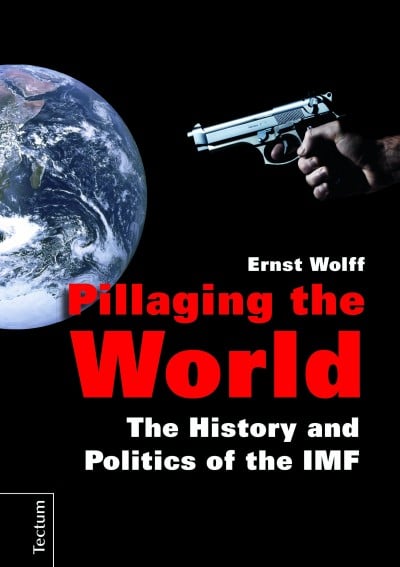Pillaging the World: The History and Politics of the IMF
The History and Politics of the IMF with Ernst Wolff
The History and Politics of the IMF with Ernst Wolff
In this video we interview journalist and author Ernst Wolff. Wolff’s latest book is called “Pillaging the World: The History and Politics of the IMF” which is also available in German and Arabic. This video series aims to provide context behind the International Monetary Fund (IMF) and the role it has played in world affairs since its formation up until the current period.
The following questions are addressed in the following video:
- What motivated Ernst Wolff to write the book “Pillaging the World: The History and Politics of the IMF“?
- Under what context was the International Monetary Fund (IMF) founded?
- Why was the International Monetary Fund founded? What role has it played in the past?
- What effects do the IMF’s policies have on the social and cultural fabric of a country?
- What terminology does the IMF employ and is there Orwellianism at play which cloaks its actual practices?
VIDEO: Ernst Wolff on the History and Politics of the IMF
To read the transcript of the video, Click here.
The rules for membership in the IMF were simple: Applicant countries had to open their books and were rigorously screened and assessed. After that they had to deposit a certain amount of gold and pay their financial contribution to the organization according to their economic power. In return, they were assured that in the case of balance of payments problems they were entitled to a credit up to the extent of their contribution – in exchange for interest rates determined
Wolff, Ernst (2014-11-18T22:58:59). Pillaging the World: The History and Politics of the IMF (Kindle Locations 181-184). Tectum Wissenschaftsverlag. Kindle Edition.
In implementing these measures, which were tightened after Britain’s defeat in Suez led to a rise of tensions in Anglo-American relations, the IMF’s strategists developed a strategy that helped them to cleverly deceive the public. Starting in 1958, they obliged the governments of debtor countries to draw up “letters of intent” in which they had to express their willingness to undertake “reasonable efforts” to master their balance of payments problems. This made it seem as though a country had itself proposed the measures that were actually required by the IMF.
But even that did not go far enough for the IMF. As a next step, loans to be disbursed were sliced into tranches (“phasing”) and thus made conditional upon the respective debtor country’s submissiveness. In addition, the IMF insisted (and still insists) that agreements between the IMF and its debtors should not be considered international treaties and therefore should not be subject to parliamentary approval. Finally, the IMF decreed that any agreements with it were not intended for the public eye and had to be treated as classified information – a scheme that applies to this day.
Pillaging the World. The History and Politics of the IMF

The following text is the forward to Ernst Wolff‘s book entitled : Pillaging the World. The History and Politics of the IMF, Tectum Verlag Marburg, 2014, www.tectum-verlag.de. The book is available in English and German.
No other financial organization has affected the lives of the majority of the world’s population more profoundly over the past fifty years than the International Monetary Fund (IMF). Since its inception after World War II, it has expanded its sphere of influence to the remotest corners of the earth. Its membership currently includes 188 countries on five continents.
For decades, the IMF has been active mainly in Africa, Asia and South America. There is hardly a country on these continents where its policies have not been carried out in close cooperation with the respective national governments. When the global financial crisis broke out in 2007, the IMF turned its attention to northern Europe. Since the onset of the Euro crisis in 2009, its primary focus has shifted to southern Europe.
Officially, the IMF’s main task consists in stabilizing the global financial system and helping out troubled countries in times of crisis. In reality, its operations are more reminiscent of warring armies. Wherever it intervenes, it undermines the sovereignty of states by forcing them to implement measures that are rejected by the majority of the population, thus leaving behind a broad trail of economic and social devastation.
 In pursuing its objectives, the IMF never resorts to the use of weapons or soldiers. It simply applies the mechanisms of capitalism, specifically those of credit. Its strategy is as simple as it is effective: When a country runs into financial difficulties, the IMF steps in and provides support in the form of loans. In return, it demands the enforcement of measures that serve to ensure the country’s solvency in order to enable it to repay these loans.
In pursuing its objectives, the IMF never resorts to the use of weapons or soldiers. It simply applies the mechanisms of capitalism, specifically those of credit. Its strategy is as simple as it is effective: When a country runs into financial difficulties, the IMF steps in and provides support in the form of loans. In return, it demands the enforcement of measures that serve to ensure the country’s solvency in order to enable it to repay these loans.
Because of its global status as “lender of last resort” governments usually have no choice but to accept the IMF’s offer and submit to its terms – thus getting caught in a web of debt, which they, as a result of interest, compound interest and principal, get deeper and deeper entangled in. The resulting strain on the state budget and the domestic economy inevitably leads to a deteriorat

No comments:
Post a Comment